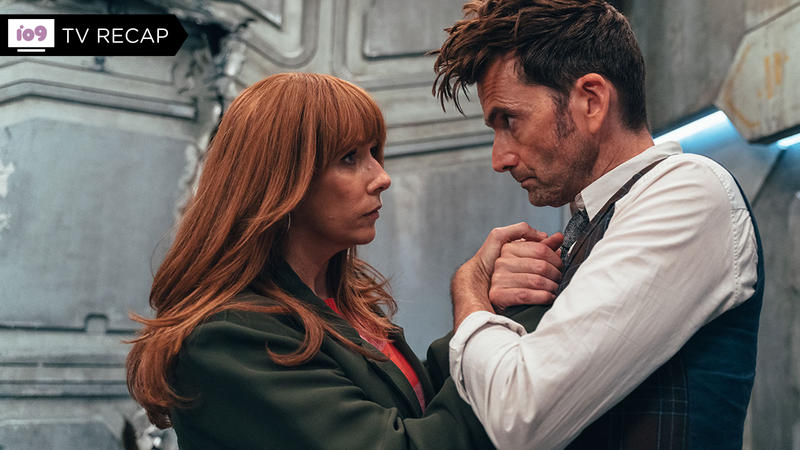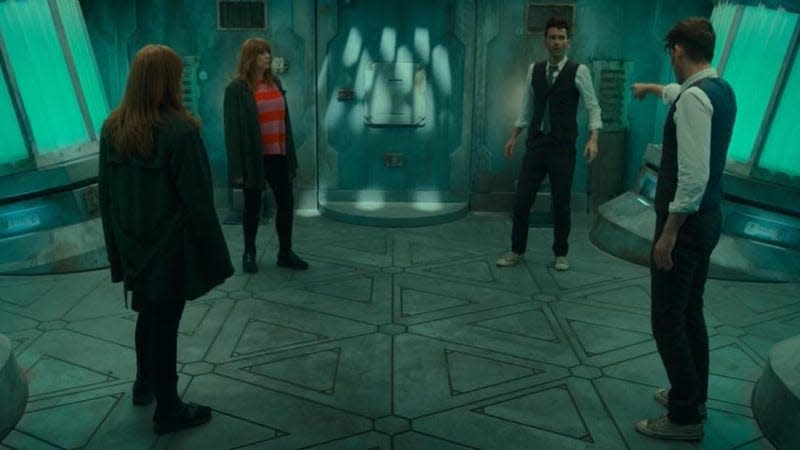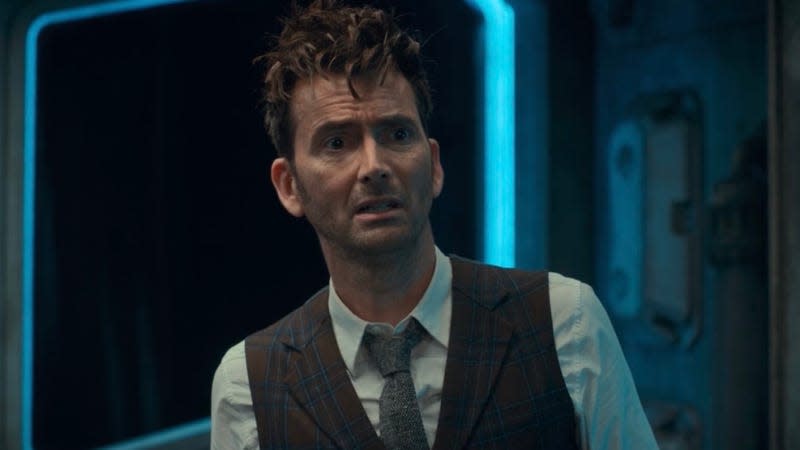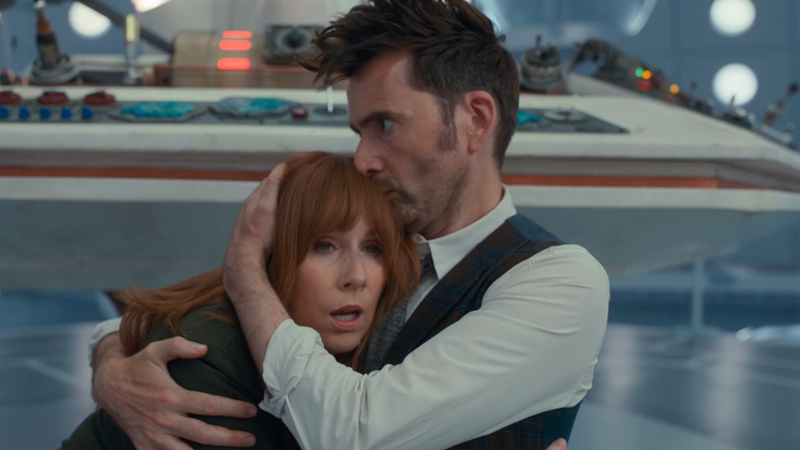On Doctor Who, David Tennant and Catherine Tate Are Literally Everything

- Oops!Something went wrong.Please try again later.
- Oops!Something went wrong.Please try again later.
- Oops!Something went wrong.Please try again later.
- Oops!Something went wrong.Please try again later.
If Doctor Who’s triumphant return in “The Star Beast” was a romp in Russell T. Davies’ hallmark style to prove that Doctor Who can really still feel like its recent past, then “Wild Blue Yonder” is a similarly triumphant attempt to prove that Doctor Who can still be weird, chilling, and inventive as it ever was. But also one other thing, too: David Tennant and Catherine Tate are perhaps two of the greatest weapons in its arsenal.

The relative secrecy coming into this episode saw Doctor Who fans—much like the show’s hero, incapable of sitting still for more than a few seconds before massively overthinking things through—speculate wildly that “Yonder” would give us the typical trappings you’d expect of an anniversary special. Familiar enemies, returning faces, special cameos of Doctors past and even future, you name it, they were certain it was in the cards. Instead, the episode is a spartan affair, largely set in an isolated location, and largely starring just Tennant and Tate’s 14th Doctor and Donna Noble. And, in true Doctor Who style, it leverages the firepower of a fully armed and operational infusion of Disney cash to create what is essentially the universe’s longest corridor to run up and down.
Read more
Hyundai Finally Replaced My Engine. Millions Of Other Owners Aren't As Lucky
Tesla Cybertruck Steel Body Raises A Lot Of Questions About Insurance And Repair Costs
Pokémon Scarlet And Violet DLC Lets You Play As The Pocket Monsters

Pitting the Doctor and Donna against each other, literally and metaphorically, further exposes just how much these two characters have changed and grown over the last 15 years. For Donna, it’s beyond just how much her family drives her, but also the ways her time with the Doctor—memories she now actually gets to keep after last week sentimentally undid the tragedy of “Journey’s End” all those years ago—made her a better, stronger version of herself, a version that the no-thing copy can never quite grasp. It’s telling that in the moments of “Wild Blue Yonder” where the Doctor and Donna are tasked with trying to figure out if they’re talking to a copy of their friend or the real deal, it’s pretty much Donna who always figures it out first. It’s reflection of just how much she really has grown, and amplified the best aspects of herself and her spirit, and seeing that tested, and for her to triumph feels like a fitting payoff to us getting “our” Donna back—this is who she is, who she always was and could’ve been had tragedy not struck, and she is as fearsome and funny and resilient as ever before.
The 14th Doctor, meanwhile, is anything but. If you were concerned coming into this trio of specials that David Tennant’s comeback would just be the the Tenth Doctor all over again, minute by minute Doctor Who is proving that this new incarnation is anything but. Where this week Donna triumphs, the Doctor falters, and is nearly broken by his encounters with the no-things, because, once again, time has passed: this is a very different Doctor, despite the face, not just because they’re a new incarnation but because they have gone through so much since Donna crossed paths with them a decade and a half ago. This is a more vulnerable Time Lord, a more emotionally open one—not just in the light ways, like how he surprises himself for thirsting over Isaac Newton after the cold open gag sees the Doctor and Donna accidentally set the stage for him exploring the theory of *checks notes* mavity (a pitch-perfect joke that delivers in spite of it not making much sense in Doctor Who’s own internal logic, but just like “The Star Beast,” who cares when it’s so much fun?). But one that has to reckon with the traumas of their recent past, and how much it’s really hit them, in ways the Doctor never actually did in those moments.

That’s what we get in an incredible scene between the Doctor and Donna, when, as the former tries to ascertain if he’s really talking to the latter or the no-thing, the Doctor is forced to deal with the ramifications of the Flux—the cataclysmic eradication of half of the known universe during the events of Jodie Whittaker’s final season, the aftermath of which was bizarrely left unexplored by former showrunner Chris Chibnall—and their part in it. This more vulnerable Doctor, unlike their predecessor and their penchant for keeping their emotions largely bottled up (a trait not just true to the 13th Doctor, but the Tenth too), is willing to expose those feelings with people, and to begin to reckon with the pain and hurt they’ve impacted upon him—and how that vulnerability is both this Doctor’s greatest strength and their greatest weakness.
It shines in his love for Donna, but here it it is almost his downfall: breaking when trying to reckon with the outcome of the Flux sees him nearly hoodwinked by what turns out to be the no-thing Donna, his inability to control those feelings to avoid the copycats from accelerating their adaptation to himself and Donna nearly dooms them as he figures out the mystery behind the vessel they’re trapped on. In the literally explosive climax, he almost realizes too late that he has brought the no-thing Donna aboard the returned TARDIS rather than the real deal, leading to a gutwrenching moment when we and Donna alike almost believe that she really is about to die—and how avoiding that moment narrowly leads to him realizing that being open with his loved ones is vital and necessary, but also something to work on. Even if we as an audience know that we have just one more week with the 14th Doctor, their arc feels meaningful over the course of these episodes as if they were here to stay for another three or four years, even beyond just letting David Tennant establish a distinct delineation between this and his performance as the Tenth Doctor.

And really, that’s a far better gift for Doctor Who’s big milestone than any cameo-laden, Avengers-esque secret reunion ever could’ve been. It’s both an exploration of the show’s past—albeit its more recent past rather than anything particularly far-flung—and a reminder of its future. If last week was Doctor Who reminding us that it can still feel warm and comforting, this week was a reminder that Doctor Who can be cold and chilling, gripping in an entirely different way, and just as weird and creepy and inventive. It’s a reminder that Doctor Who should always be in conversation with itself, moving forward but not forgetting to build on and address the events of its past, and their impact on its heroes.
As we head into one final adventure with the 14th Doctor and Donna next week—and the inevitably that at least one of them will be saying goodbye for good—we’ve seen them embraced in nostalgic joy and tempered in the terrifying unknown. Whatever comes next, they’ll be ready for it... even if we, the audience, getting to enjoy such a thoroughly great streak of Doctor Who these past few weeks, might not be quite so ready to let go of them again just yet.
Want more io9 news? Check out when to expect the latest Marvel, Star Wars, and Star Trek releases, what’s next for the DC Universe on film and TV, and everything you need to know about the future of Doctor Who.
More from Gizmodo
Sign up for Gizmodo's Newsletter. For the latest news, Facebook, Twitter and Instagram.

